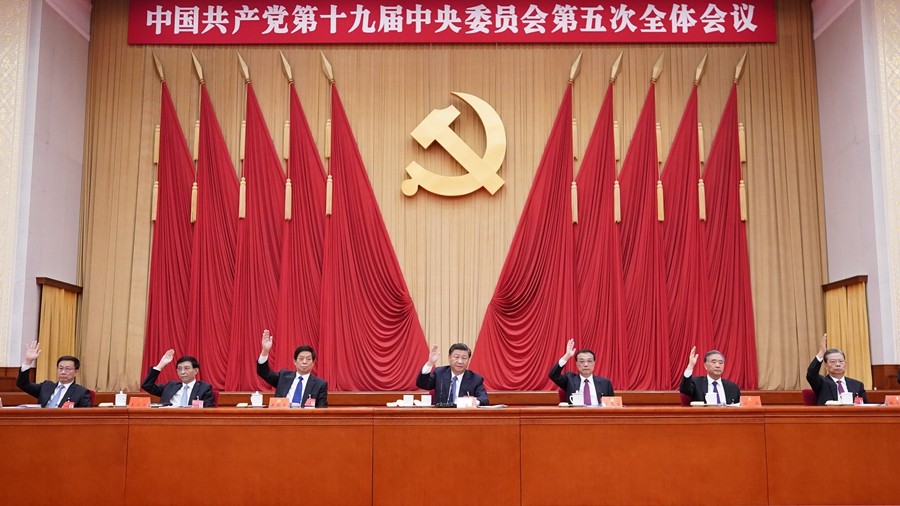
Editor's note: Keith Lamb is a University of Oxford graduate with a MSc degree in Contemporary Chinese Studies. His primary research interests are international relations of China and China's "socialism with Chinese characteristics." The article reflects the author's opinions, and not necessarily the views of CGTN.
According to a communique released after the fifth plenary session of the 19th Central Committee of the Communist Party of China (CPC) on Thursday, China will comprehensively deepen reform in pursuit of a high-level socialist market economy. While upholding China's basic economic system, the CPC plans to give full play to the decisive role of the market in resource allocation.
Markets, which have been in full swing since China's reform and opening-up in 1978, mean business, trading, capital and profits. These words for many in the West are related to capitalism, not socialism. Indeed, the paradox of China's prosperity over the past 40 years is that although it has lifted 800 million out of poverty, the gap between rich and poor has also grown.
The conditions of capital accumulation and inequality led to a debate within Western academia as to whether China had derailed from the socialist path. For example, Chun Lin, a professor in comparative politics from the London School of Economics, in her book "The Transformation of Chinese Socialism" poses the question whether the reforms that have taken place since Deng Xiaoping's reform and opening-up to the world stand against socialism in terms of practices.
For sure, a market economy brings about contradictions but contradictions are precisely what Marxists thrive on, for these are what drive history forward. To assume that China's present political-economic conditions, which are labelled the primary stage of socialism, represent the desired end goal of the CPC and the Chinese people, would be to mistake the journey for the destination.

The 19th Central Committee of the Communist Party of China (CPC) concludes its fifth plenary session in Beijing with the release of a communique, October 29, 2020. /CGTN
The 19th Central Committee of the Communist Party of China (CPC) concludes its fifth plenary session in Beijing with the release of a communique, October 29, 2020. /CGTN
Markets are not the defining factor of a Marxist or a capitalist state. They are merely a tool for accumulation and development. Instead, the pertinent question, for defining a Marxist or a capitalist state in regards to the use of markets, is ultimately who is the market for?
If the contradictions produced by the market are seen as an inherent universal good, where class relations are justified until the end of time, then the state is capitalist. If market contradictions are used, astutely, to produce wealth for all, and for the purpose of creating a surplus and technological base for constructing future equality, then the state is Marxist.
For example, in the U.S., where the rich-poor divide is widening, official statistics from the U.S. Census Bureau show more than 40 million American people are now living in poverty. However, unlike a Marxist state this is justified as just "one of those things."
For the capitalist U.S., there is little introspection into changing the political-economic status-quo. This is because the market, capital accumulation and a class system are the inherent goals. The contradictions inherent in the U.S. are propagandized as the end rather than the historical driver to a new system.
In contrast, in China, market inequality, which has been widely discussed in the Chinese media, has caused consternation. This is because it could derail the socialist development goals of the CPC.
The very concern was highlighted in President Xi Jinping's speech, given on November 12, 2013, entitled "Align Our Thinking with the Guidelines of the Third Plenary Session of the 18th CPC Central Committee." He recognized the great achievements of the market and opening-up while also stressing that the injustices produced by the market must be resolved for the purpose of achieving future socialism.
Xi said, "As China develops further and the people's living standards improve, public awareness of equality and democracy, and of rights and interests, has been steadily enhanced, and hence people's resentment at injustice becomes more pronounced."
"After comprehensively reviewing and analyzing China's current social and economic development, the CPC Central Committee has concluded that this problem, if not resolved in good time, will reduce public confidence in our reform and opening-up, and undermine social harmony and stability. As the 18th CPC National Congress pointed out, fairness and justice are inherent requirements of socialism with Chinese characteristics."
To the end of building socialism with Chinese characteristics, the 14th Five-Year Plan will be another step towards this goal. "Double Development Dynamics" strategy aims to improve livelihoods and freedom to consume. Technological upgrading will increase the capacities of workers. The "Healthy China 2030" blueprint will create a universal healthcare system.
In the transformation described above, the market, which will continue to open up to the world, will play a leading role in achieving China's socialist aims. The use of markets and contradictions they carry requires vigilance. However, absolute equality cannot be wished into existence and thus far the pragmatic development tool, which is the market, if used by a skillful worker, can continue to yield positive results.
(If you want to contribute and have specific expertise, please contact us at opinions@cgtn.com.)